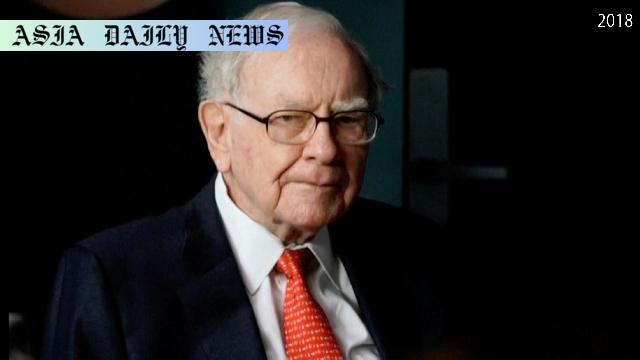Buffett Resignation: Renowned US investor Warren Buffett has announced plans to step down as CEO of Berkshire Hathaway this year.
Renowned US investor Warren Buffett to step down as Berkshire Hathaway CEO at 94.
The board is expected to appoint Greg Abel as Buffett’s successor.
Buffett emphasized maintaining long-term investments and criticized trade tariffs.
The announcement marks historic leadership change in modern capitalism.

Warren Buffett Announces Retirement as Berkshire Hathaway CEO
In a significant announcement during the annual shareholders meeting held in Omaha, Nebraska, Warren Buffett, the iconic figure behind Berkshire Hathaway, has revealed his decision to step down from the role of Chief Executive Officer by the end of this year. Buffett, celebrated globally for his astute investment strategies and remarkable foresight, has been at the helm of the investment giant for decades. With his leadership, Berkshire Hathaway transformed into one of the most valuable corporations in modern capitalist history.
The news of Buffett’s resignation, as reported by The New York Times, marks a pivotal moment in the financial world. His successor, Greg Abel, currently Vice Chair, is set to take the reins, pending board approval. Abel has been working closely with Buffett and is considered highly capable of continuing the company’s legacy of success and financial discipline. The transition has been closely anticipated, as Buffett, now 94, is among the oldest CEOs still leading a major corporation.
The Oracle of Omaha’s Legacy of Long-Term Growth
Over decades, Buffett earned the moniker “The Oracle of Omaha” due to his exceptional ability to identify long-term growth opportunities. He has long advocated for steady investment in businesses with strong potential for expansion. His portfolio expanded across diverse industries, including technology giant Apple and financial stalwart Bank of America. More recently, Buffett increased Berkshire’s stakes in five prominent Japanese trading firms, reinforcing his unwavering belief in international market growth.
Buffett has often emphasized patience as a key driver of investment success. During the Saturday meeting, he reiterated the importance of holding onto these Japanese shares, underscoring that long-term focus in strategies remains as essential as ever for future progress. His investment philosophy proved to consistently outperform, earning Berkshire Hathaway and its investors significant returns under his stewardship.
Criticism of Global Trade Restrictions
Apart from announcing his departure, Warren Buffett also took the opportunity to voice his opinions on trade policy. Criticizing the tariff measures implemented by the US administration under former President Donald Trump, Buffett stated, “Trade should not be a weapon.” Instead, he urged for stronger collaboration and open trade relations across global economies.
Buffett’s remarks fall in line with his broader emphasis on cooperative global trade. His comments often reflect a belief in partnerships, shared prosperity, and a competitive yet inclusive financial landscape. By imploring nations to opt for sustainable trade policies, Buffett has always emphasized ensuring that economic benefits remain accessible across borders.
A Historic Leadership Shift
As one of the leading voices in financial markets, the departure of Warren Buffett is both a symbolic and practical turning point. His planned retirement marks the end of an era for Berkshire Hathaway, a company that has since become synonymous with market resilience and forward-thinking strategies. The world at large will be closely watching Greg Abel’s leadership, particularly as he attempts to uphold the values and strategies championed by his predecessor.
Nonetheless, Buffett’s legacy and methods will likely continue to dictate global investment strategies. From his early years to his last chapter as CEO, Buffett remains one of the most successful business figures the financial world has seen.
Commentary
Reflecting on Warren Buffett’s Legacy and Leadership
The announcement of Warren Buffett’s impending resignation from his role as CEO of Berkshire Hathaway undoubtedly feels like the close of a monumental chapter in the world of investments and leadership. At 94 years old, Buffett’s decision to step down comes as little surprise given his age; however, it does prompt an important discussion around his unmatched legacy and philosophy that shaped modern capitalism as we know it.
A Role Model for Financial Prudence and Patience
What sets Buffett apart has always been his disciplined approach to investing, underscored by patience and a keen ability to identify long-term winners. His consistent message that success in investment requires foresight and composure is a lesson that resonates far beyond Wall Street. Institutions, individual investors, and economists look up to his strategies as a benchmark of reliability and sustainability in a notoriously volatile field.
Challenges Moving Forward
For Berkshire Hathaway, the transition to Greg Abel’s leadership could mark the beginning of new opportunities or challenges. Abel occupies a daunting position, filling the shoes of a globally celebrated leader. However, given his close work with Buffett and alignment with Berkshire’s culture, there is room for optimism. The next phase will undoubtedly test Abel’s resilience and leadership skills.
A Broader Implication for Trade
Finally, Buffett’s call for a cooperative global trade system further underscores his belief in building bridges rather than borders. His criticism of weaponizing tariffs speaks volumes about his vision that trade policies should be constructive. Policymakers and financial leaders alike could take this as a cue to prioritize sustainable collaborations over divisive tariffs.
As the financial world reflects on Buffett’s exit, one thing is for certain—his legacy as the god of investments will inspire generations to come, ensuring that his influence endures.


